SECURITY INFORMATION
This information is required under Public Law 102-26. The following data will provide you with campus security policies and statistics concerning the occurrence of criminal offenses on campus and non-campus building/public property related to the college.
Should you witness a crime in progress or are a victim of a crime, Academy for Nursing and Health Occupations requests that you follow this procedure:
- During school hours, notify the Academic Dean or the college’s Executive Director and the Palm Beach County Sheriff’s Department immediately, Academy for Nursing and Health Occupations – 561-683-1400, and Palm Beach County Sheriff’s Department – 911 or for non-emergency calls – 561-688-3400.
- If a crime occurs during non-school hours and no faculty or staff member is available, notify the Palm Beach County Sheriffs Department immediately and the School’s President as soon as possible.
- Remember: Preserving evidence for proof of a criminal offense is very important. The Academy for Nursing and Health Occupations does not recognize any off campus student organizations. The purpose and authority of faculty and staff is limited to securing the premises and protecting the facility. The enforcement authority of faculty and staff is limited to the enforcement of campus rules and regulations. Incidents that go beyond the scope of faculty and staff are referred to and investigated by the local law enforcement agency (if applicable). All crimes that are reported will be posted in the Media Center within a day of the reporting.
To ensure accurate and prompt reporting of all crimes, authorized administrative personnel will take a full written statement from involved parties and witnesses at all reported emergency or criminal incidents. The written statements are included as part of a written report, and such statements may be used by local/state law enforcement authorities for the purpose of criminal apprehension and/or crime prevention. Criminal incidents may also be reviewed by the institution’s administrative staff for the purpose of disciplinary action.
All students are informed about campus security procedures and practices on the first day during orientation.Everyone should remember that personal safety begins with you. The following should be considered:
- When walking on campus, be aware of who and what is around you. Try not to walk alone and avoid streets and secluded pathways or alleyways.
- Do not carry large amounts of cash.
- Keep your motor vehicle in good running condition. Always lock your car and remove all packages and any valuables. Try to park in a well-lighted area.
- Do not leave books or personal property unattended in the classroom, lobby, library, media center, or restroom.
Sexual Assault Programs are available at:
|
Belle Glade |
561-996-4871 |
|
Southern Palm Beach County |
561-274-1500 |
|
Northern Palm Beach County |
561-355-2418 Opt. 3 |
|
Central Palm Beach County |
561-355-2418 Opt. 3 |
Counseling for sex offense victims is available at:
|
Rape/Victim Hotline |
561-833-7273 |
|
Sexual Assault Program |
561-355-2418 |
If applicable and reasonably available, Academy for Nursing and Health Occupations will change the academic situation of a student after an alleged sex offense.
If any disciplinary proceedings are held in cases of an alleged sex offense, both the accuser and the accused have the opportunity to have others present. Both the accuser and accused will be informed of the institution’s final determination of any institution disciplinary proceeding and any sanction imposed against the accused. Immediate termination may be imposed regarding rape, acquaintance rape, or other forcible or non-forcible sex offenses.
The institution is in compliance with the Drug Free Schools and Communities Act of 1989 (Public Law 101-226). All students and employees should refer to the “Drug and Alcohol Prevention Program” for information concerning policies and individual responsibilities required under this Act.
The following definitions are essential in properly reporting crime statistics:
- “Campus” — any building or property owned or controlled by the institution that is within a “reasonably contiguous geographic area” of the institution and is used by the institution in direct support (or in a manner related to) the institution’s educational purposes (e.g., residence halls). Additionally, property, within a “reasonably contiguous geographic area” of the institution, that is owned by the institution but controlled by others must be included in crime statistics if it is used by students and supports institutional purposes (e.g., food or other retail vendor.)
- Non-campus building or property” — any building or property owned or controlled by a student organization recognized by the institution. Additionally, a building or property owned or controlled by an institution that is used by students in direct support of our in relation to the institution’s educational purpose and is not within a reasonably contiguous geographic area of the institution.
- “Public property” — all public property that is within the “reasonably contiguous geographic area” of the institution such as the sidewalk, street or a parking facility and that is adjacent to a facility owned or controlled by the institution if the facility is used in direct support of or in a manner related to the institution’s educational purposes
